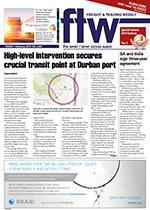It is still too early to determine what the effects of a new era of government in the Democratic Republic of Congo (DRC) will have on the ease of doing business and economic prospects of the country. Following what many observers see as a deeply flawed election process, opposition leader Felix Tshisekedi has been sworn in as the first president to take over control of the DRC without bloodshed since the country gained independence from Belgium in 1960. The DRC is Africa's biggest copper producer and is home to more than 60% of the world's cobalt. The two minerals account for 80% of the country's export revenue, according to the World Bank. Due to poor to nonexistent internal road and rail infrastructure, miners are largely reliant on the ports of Dar es Salaam, Beira, Durban, Cape Town and Walvis Bay for exports and inputs rather than the country’s ports of Banana and Matadi on the Congo River. Both are shallow-water ports, but there are plans by DP World to upgrade Banana to a deep-water harbour after being granted a 30-year concession in 2018. The Democratic Republic of the Congo has fewer allweather paved highways than any country of its population and size in Africa — a total of 2 250 km, of which only 1 226 km is in good condition. Three of the Trans-African Highway network’s routes pass through the DRC. The Tripoli-Cape Town Highway crosses the western extremity of the country on National Road No 1 between the capital Kinshasa and the port city of Matadi, a distance of 285 km on what is described as “one of the only paved sections in fair condition”. The Lagos-Mombasa Highway is described as a “missing link” which needs a new road to be constructed before it can function. A large percentage of mining-related cargo moves on the Beira-Lobito Highway, an east-west highway that crosses Katanga and requires re-construction over most of its length.

